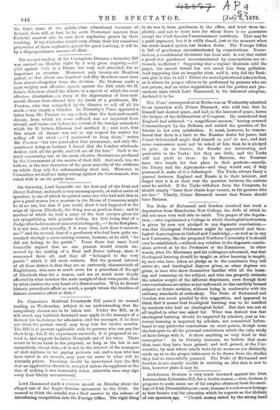The Duke of Richmond and Gordon received last week a
deputation from Manchester New College, the drift of which he did not seem very well able to catch. The prayer of the deputa- tion,—who represented a College in which theological instruction is given by men not pledged to any dogmatic conclusions,— was that theological Professors might be appointed and theo- logical degrees given in Oxford and Cambridge,—as well as in any new University, like the proposed Northern University if it should ever be established,—without any relation to the dogmatic conclu- sions arrived at by the Professors or the Examinees. In other words, what Dr. Martineau and his colleagues advocated, was that theological learning should be taught as other learning is taught, by men who have taken no pledge as to the conclusion they will arrive at ; and theological degrees given, as other degrees are given, to men who show themselves familiar with all the learn- ing and reasoning on the subject, and who can properly estimate the relative weight of the different disputants, even though their own conclusions are either as yet unformed, or else carefully formed subject to future revision, without being in conformity with the ordinary standards of orthodoxy. The Duke of Richmond and Gordon was much puzzled by this suggestion, and appeared to think that it meant that theological learning was to be instilled by teachers who had no theological belief. But that was not at all implied in what was asked for. What was desired was that theological learning should be imparted by scholars, just as his- torical learning is imparted by scholars, not committed before- hand to any particular conclusions on moot points, though none the less open to all the personal convictions which the calm study of facts brings with it. Is there anything so very hard in that conception ? As to Divinity honours, we believe that more than once they have been gained, and well gained, at the Uni- versities, by men whose minds were by no means as yet distinctly made up as to the proper inferences to be drawn from the studies they had so successfully pursued. The Duke of Richmond and Gordon is not exactly nimble in catching an idea that is new to him, however plain it may be.


































 Previous page
Previous page